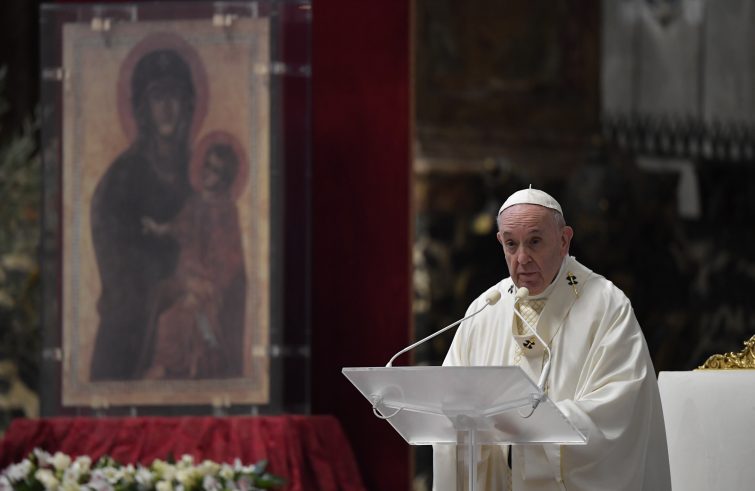
“Today I wish to be close to priests, to all priests”: this is the heart of the homily of the “in Coena Domini” Mass marking the beginning of the Paschal triduum, presided over by Pope Francis in St. Peter’s Basilica, site of all Easter celebrations in time of coronavirus. The intense, unscripted homily, lasted about ten minutes and was specifically devoted to priests, on the first Holy Thursday when the Chrism Mass was not held owing to the current health crisis. “Today Chrism Mass will not be celebrated. I hope it can be celebrated before Pentecost. If not, it will have to be postponed until next year”, Francis announced. “I can’t allow this Mass to go by without remembering all the priests who have given their lives to Christ, the priests who are servants.”
“More than 60 priests have died in Italy over the past days”, Francis said, referring to the Covid-19 pandemic: “together with the doctors and nurses, they are the saints next door, priests who knowingly sacrificed their lives.”
In his opening words, Francis recalled the theme of service and the rite of foot washing, “that gesture that is a condition for entering the Kingdom of Heaven”, omitted for the first time on Holy Thursday, owing to the restrictive measures for the coronavirus. “Anointed to serve everyone”, the Pope said. “In the exchange of words with Peter,” Francis continued, “the Lord makes us understand that in order to enter the Kingdom of Heaven we must allow the Lord to serve us, to be the servant of God, our servant. This is difficult to understand.
If I don’t allow the Lord to be my servant, to make me grow, to forgive me, I will not enter the Kingdom of Heaven.”
The Pope then turned his thoughts to the many priests “who are far away”, like the prison chaplain who in a letter told him “how he is living this Holy Week with the detainees.” The Holy Father remembered “the priests who proclaim the Gospel in remote places and die doing so.” Francis recalled that “a bishop told me that the first thing he did when he arrived in lands of mission was to go to the cemetery, to visit the tombs of the priests, young priests, who had given their lives there, for the local population. Nobody knows their name, they are anonymous priests.” The Holy Father’s tribute also went to “country priests who serve as pastors to four, five, seven villages and travel from one to the other, they know the local inhabitants”: “Once,” Francis revealed, “one of them told me that he knew the names of all the villagers. “Really?” I said. ‘Even the name of the dogs’. Priestly closeness: good priests! Today I remember them in my heart and on the altar.” Francis’ special list includes the “defamed priests, who cannot go out on the streets because people say bad things to them. Some told me that they couldn’t leave the house because they were insulted. Sinner priests, who, along with sinner bishops and a sinner pope, never forget to ask forgiveness and learn to forgive. For they know that they need to ask forgiveness and to forgive. We are all sinners.” Finally, there are “priests who suffer after a crisis and don’t know what to do. They are living in obscurity.” “Today, all of you, my dear brethren priests, consecrated men and women, you are with me at the altar”, Francis assured: “Do not be stubborn like Peter, let the Lord wash your feet. The Lord is your servant. He is close to you to give you strength, to wash the feet. And with this awareness of the need to be washed,
you will be great at forgiving.”
“Never be afraid to forgive.” Francis said: “Many times we are doubtful. Look at Christ, He forgives everyone. Be courageous, also in taking risks in forgiving, in consoling. If you cannot grant sacramental forgiveness at that moment, give consolation and leave the door open for your brother to return. I thank God for the gift of the priesthood and for you: Our Lord Jesus loves you, He only asks that you allow Him to wash your feet.”










